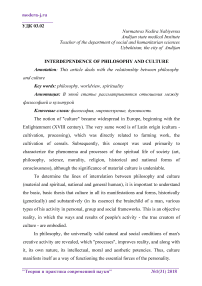Interdependence of philosophy and culture
Автор: Nurmatova N.N.
Журнал: Теория и практика современной науки @modern-j
Рубрика: Основной раздел
Статья в выпуске: 1 (31), 2018 года.
Бесплатный доступ
This article deals with the relationship between philosophy and culture.
Philosophy, worldview, spirituality
Короткий адрес: https://sciup.org/140289428
IDR: 140289428
Текст научной статьи Interdependence of philosophy and culture
The notion of "culture" became widespread in Europe, beginning with the Enlightenment (XVIII century). The very same word is of Latin origin (cultura -cultivation, processing), which was directly related to farming work, the cultivation of cereals. Subsequently, this concept was used primarily to characterize the phenomena and processes of the spiritual life of society (art, philosophy, science, morality, religion, historical and national forms of consciousness), although the significance of material culture is undeniable.
To determine the lines of interrelation between philosophy and culture (material and spiritual, national and general human), it is important to understand the basic, basic thesis that culture in all its manifestations and forms, historically (genetically) and substantively (in its essence) the brainchild of a man, various types of his activity in personal, group and social frameworks. This is an objective reality, in which the ways and results of people's activity - the true creators of culture - are embodied.
In philosophy, the universally valid natural and social conditions of man's creative activity are revealed, which "processes", improves reality, and along with it, its own nature, its intellectual, moral and aesthetic potencies. Thus, culture manifests itself as a way of functioning the essential forces of the personality.
The development of culture is in direct connection with the development of the human being from natural dependence, his development by the state, society, and his own. Freedom, which is the central problem of philosophical anthropology, as it is achieved, determines the development of man by the results of his own activity, and not by the intervention of external forces, including supernatural forces, otherworldly forces. Thus, culture receives deep philosophical grounds for realizing the possibilities of liberated labor in the creation of material and spiritual values. Some of them are unique in nature, they are unique, have a general cultural significance.
It is very characteristic that in society there is a certain synchronicity in the development of philosophy and culture: both their high achievements and decline. This is evidenced by the European history of antiquity, the Middle Ages and the Renaissance. This raises the question of the criteria for the development of culture, including the character (the way, the level) of man's relationship to man, society, nature, the state of enlightenment and science, art, philosophy, literature; the role of religion in society;
qualitative assessment and degree of cognition of the prevailing norms of life (the epistemological aspect of culture), etc.
In philosophy, it is customary to divide production into the material, spiritual, and production of man himself. For culture, this provision has a general methodological significance: not only in the sense that it serves as a basis for the typology of culture, but also for such a generalizing definition as the cultivation of "all the properties of a social person and the production of it as a person with possibly richer properties and connections, and according to needs and requirements, - the production of man as possible more holistic and universal product of society ... "1
The result of the development of man, his material (production-economic) and ideal (spiritual) activity. It results in two ways: the result is a visible and tangible external wealth that receives in the market economy the form of a growing number of diverse goods, services and information, and the invisible, hidden, but special value of the inner wealth of the human personality.1
Philosophy, using axiological (axia - value), that is, the value approach, reveals the correlation of the inner world of man, his ideological orientations, motivations, needs and interests, achieved in general the level of personal culture and extrinsic forms vital activity, aimed at creating universally valid samples of material or spiritual culture. Thus, it forms the sphere of manifestation of the true essence of man, acts simultaneously as an incentive stimulus, a necessary condition and an aggregate result of its development,
This means that in philosophy a person is considered not as an object, but as an active cumulative subject, not only knowing, but also creating the world of culture. If the inner world of this subject is deficient, low level of intellectual, moral and aesthetic development - lack of spirituality, then it is capable of producing only grimaces of culture, or anticulture. You can, to paraphrase a well-known expression, say the following: Tell me what people lived in the country (in this or that epoch) or people live, and I will tell you what was there or is culture
Used course:
O'raqova O. J. THE PLACE OF THE JADIDS IN THE DEVELOPMENT OF THE UZBEK EDUCATION //Теория и практика современной науки. – 2017. – №. 5. – С. 38-40.
Список литературы Interdependence of philosophy and culture
- O'raqova O. J. THE PLACE OF THE JADIDS IN THE DEVELOPMENT OF THE UZBEK EDUCATION //Теория и практика современной науки. - 2017. - №. 5. - С. 38-40


